Andrés Caballero | MFA Program | Photography, Video and Imaging | College of Fine Arts
Borderland Masks
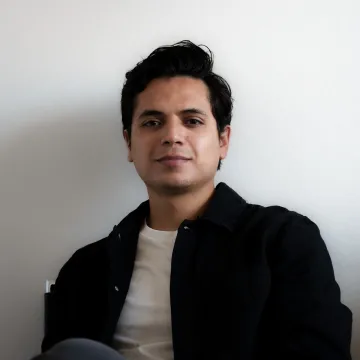
For almost one hundred years Lucha Libre events in Mexico have played a pivotal role in shaping and reinforcing Mexican identity. Within the ring, Mexican wrestlers embody intricate social constructs related to class, ethnicity, gender roles, indigeneity and hybrid beliefs. Having grown up attending these events, watching El Santo (one of the most renowned luchador in history) movies and the various forms of media that transmitted his enormous pop culture success, I’ve witnessed how these portrayals have altered my own perception of identity. Through photo, video and oral history recordings I will explore the particularities of Lucha Libre events around the border region in Sonora and Arizona. Focusing on the significance to the people that follow this tradition. The outcome will be a portrait exhibition of Mexican people who wear their Lucha Libre mask with pride at their homes, places of upbringing, workplaces and along the border. Additionally, I will record the oral history of these individuals focusing on their upbringing, immigration experiences, life in the border region and what attending the Lucha Libre events mean to them. Finally, I will make 360-degree video clips from the center of the ring that immerse the viewer in the Lucha Libre experience and engage people on a visceral level. The final exhibition will be hosted in two arenas, one in Sonora and the other in Arizona, rendering it a public event and extending access to the same demographic that are the spectators of this tradition.
Andrés grew up in Mexico City, where he began working in documentary films and later included photography in his practice. There, Andrés began an examination of Mexican identity through Lucha Libre events. He has been working on this subject for around 2 years, presenting a photographic exhibition called “Your Insults are Welcome” inside a Mexican Wrestling arena. Andrés’ work delves into the complexities and contradictions of the human experience while also exploring what identity means and how it is built over the years. Sociology has been an important point of reference, providing insights into how people develop specific behaviors, traits, and traditions according to their own environment. Andrés received his BA in Communications and Media Studies at the Universidad Iberoamericana in Mexico City. Andrés is a recipient of a Fulbright Scholarship to pursue a graduate degree in the United States, where he is an MFA candidate in the Photography, Video and Imaging department at the University of Arizona’s College of Fine Arts.
Natasha Cortinovis | MA Bilingual Journalism | School of Journalism | College of Social & Behavioral Sciences
Native Americans & The Border Wall
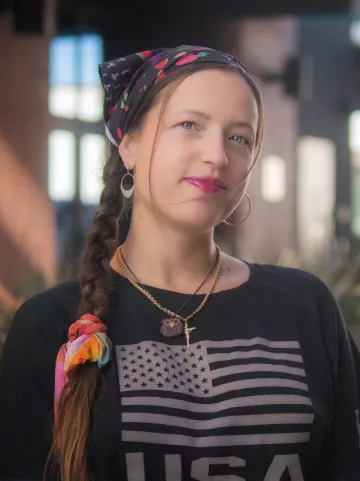
In November 1989, the Berlin Wall came crashing down. Almost everybody in the world cheered loudly. However, within five years of its fall, the United States started building their own wall at the U.S.-Mexico border. For the past twenty-five years, a wrought-iron railing the color of blood has kept rising on top of what before was just a symbolic ranch-style fence line separating the two countries. In a few years, the harmless fence turned into a sinister 30-feet steel wall with strings of concertina wire stretched toward the sky, covering about 800 miles of the 2000-mile border. The billions of dollars spent in its construction could have supported education, healthcare, or the environment instead.
The militarized structure harms some of the richest wildlife communities and oldest human settlements in North America: the wall cuts through the tribal homelands of at least seven Native American Nations in the United States, and several indigenous peoples in Mexico, separating tribe members from their relatives, sacred sites, and natural environments. Every day since the wall has been standing, people on both sides have been traveling to meet, talk, eat, touch hands, and even kiss through the openings in the iron bars.
“Native Americans & The Border Wall” wishes to be a 15-20 minutes documentary that investigates the social, cultural, human, and environmental harm that the construction of the physical border wall has brought to the native peoples’ lives and homelands along the entire Southwest Border.
Natasha Cortinovis is a master’s student in the Bilingual Journalism Program at the University of Arizona, and a Spanish Graduate Teaching Assistant. She previously earned an MA in TESOL, and a Spanish/Latin American Literature Certificate at the University of West Virginia, and an MA in Languages' Teaching at the University Of Aosta Valley (Italy). From Northern Italy, Natasha is also a hiking guide in the Italian Alps, a fond traveler and an outdoor enthusiast. She wishes to translate books from Slovak into English, become a Diving Instructor and a Journalist for underserved communities, the environment and wildlife.
Deyanira Ibarra | PhD Program | School of Anthropology | College of Social & Behavioral Sciences
Birthworkers in the Borderlands: Understanding how the Cihuapactli Collective Reshapes Reproductive Landscapes
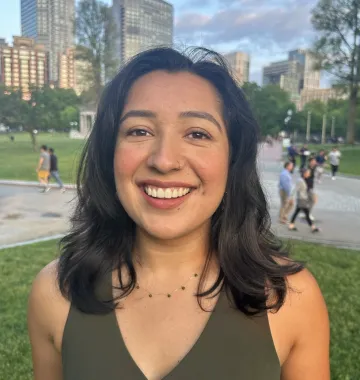
The landscape of reproductive care in Arizona lacks providers and clinics, restricts access to services and care, and imposes fees that reduce reproductive autonomy, disproportionately impacting communities marginalized by their race, gender, sexuality, ability, citizenship status, and class. In response, birthworkers – non-medical birth companions who provide informational, physical, and emotional support to people during abortions, pregnancy, birth, and the postpartum period – are mobilizing to address gaps in reproductive healthcare provision. The Cihuapactli Collective in Tucson, Arizona is a group of Indigenous, Black, and Latinx birthworkers who offer full-spectrum reproductive care in their communities while cultivating mutual support amongst each other. Increasing the collective’s visibility has urgent implications; sharing knowledge creates reproductive care options and fosters community belonging by offering a model of solidarity building that can expand autonomy and access for marginalized communities.
With the 2024 Mellon-Fronteridades Graduate Fellowship, I will collaborate with the Cihuapactli Collective to organize a visual-narrative exhibition that introduces Tucson to local birthworkers through photography and personal narratives about their relationship with birthwork. This project transcends disciplinary boundaries, blending art and storytelling to increase birthworker visibility and public engagement. It will practically advance understandings of the causes and responses to reproductive (in)justice in the U.S.-Mexico borderlands by documenting how birthworkers leverage ancestral and learned knowledges to enact community care. Overall, this collaborative exhibition will highlight the histories, heritages, and sociopolitical environments of individuals who join a collective to alleviate gaps in reproductive health care provision.
Deyanira Ibarra (she/they) is a Chicana birthworker and sociocultural anthropology Ph.D. student at the University of Arizona with research interests at the intersection of reproductive autonomy, landscapes of care, and networks of solidarity in the U.S.-Mexico borderlands. Deyanira’s approach to research and the co-production of knowledge is informed by lived- experiences, Black feminist theories, and Indigenous feminisms. Deyanira completed their B.A. in Women’s and Gender Studies at Wellesley College and M.S. in Narrative Medicine at the University of Southern California.
Dugan Meyer | PhD Program | School of Geography, Development and Environment | College of Social & Behavioral Sciences
Visualizing Surveillance Infrastructure in the U.S.-Mexico Borderlands
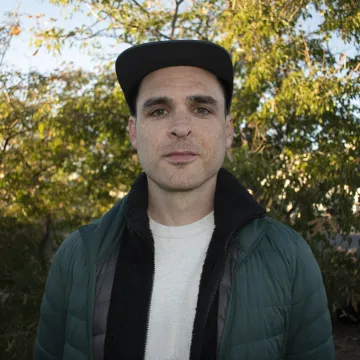
Visualizing Surveillance Infrastructure in the U.S.-Mexico Borderlands is a collaborative research and photography project by Dugan Meyer and Colter Thomas based on fieldwork conducted over more than 2,500 miles along the U.S.-Mexico border in Arizona, California, New Mexico, and Texas. The project aims to make U.S. border security infrastructure—particularly the expanding network of surveillance towers that stretches from remote patches of desert to small towns and bustling metropolises, from residential back yards to community college campuses, and from public parks and nature preserves to private ranches across the region— more visible to public audiences in order to promote informed discussion about the social, cultural, and environmental impacts of border policing on the U.S.-Mexico borderlands. This is accomplished through a public website and a multimodal exhibition of photographs and supporting texts on the University of Arizona campus in April 2024, and longer-term outcomes including a published photography book and second public exhibition in Tucson, Arizona.
Dugan Meyer is a PhD student in the School of Geography, Development & Environment at the University of Arizona. His work explores how police power shapes social landscapes, particularly in the United States. He lives in Tucson, Arizona.
Alexandra Mora Medina | MFA Bilingual Journalism | School of Journalism | College of Social and Behavioral Sciences
Climate Migration at the Borderlands: El Impacto de Desastres.
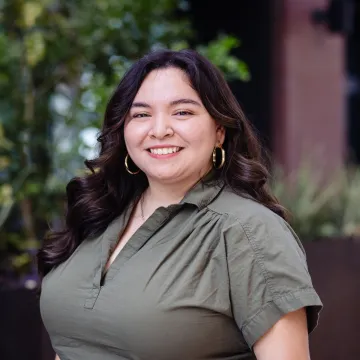
As climate change has become a prominent topic in mainstream media there is not enough attention on documenting climate migration. Climate migration is the movement driven by the impact of sudden or gradual climate-exacerbated disasters. My project will consist of documenting the movement of migrants who are displaced because of climate-related disasters. The project will use multimedia components such as audio, video, and photography to humanize these issues. I will also be using data and interviewing climate scientists to understand the science behind climate change. Additionally, I want to highlight the various push and pull factors that climate migrants are enduring and how it impacts them when they migrate to the Nogales, Sonora border.
Alexandra Mora Medina is a Master of Arts student in the Bilingual Journalism Program at the School of Social Behavior at the University of Arizona. She was born in Phoenix, Arizona, and raised in Tolleson, Arizona. She is of Mexican descent. She graduated with a bachelor's degree in journalism and mass communication from the Walter Cronkite School of Journalism and Mass Communication at Arizona State University in May 2022. During her undergraduate degree, she was a sustainability reporter and worked with environmental nonprofit groups where her passion for climate justice began. Alexandra is a passionate storyteller. Her focus has been on audio journalism covering community and environmental issues. She has been published in The Latino Reporter, KJZZ, and Cronkite News. As an academic, she is interested in Latinx News Media, Environmental Justice, and the Borderlands. When she is not working you can find her involved in her student community at the University of Arizona or spending quality time with her loved ones.
Sanjukta Sarkar | PhD Program | Teaching, Learning, and Sociocultural Studies | College of Education
Feminist Pedagogy of Global South to North Migration
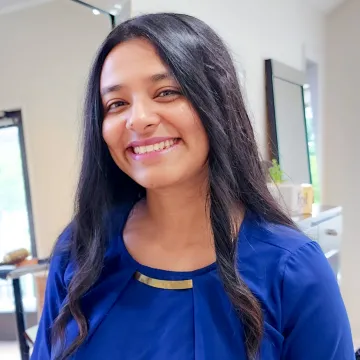
The copious theorization on the logics of migration does not tell us why we have a sudden surge of population from as far away as India crossing the Arizona-Mexico border. Is journeying to the other side of the world, from ‘periphery’ to ‘core’, enough to alter their structural positionality in the world-system? What is their story that convinces them to embark on such a treacherous journey? Why are they leaving documents with which their identities can be reconstructed along the militarized border? Understanding the answers to these questions is significant because “the personal is international” and making feminist sense of this international investigation is a push towards informing feminist policy and pedagogy. Between borders moving over people and people moving over borders, there is a pedagogy of migration that is being shaped, written, and practiced by migrants from the global south. It is a pedagogy of abundant hope, agency, resistance, and social transformation, and is feminist in its counterhegemonic pushback against systemic inequality. This Participatory Action Research explores how migrants from the global south reshape the world as they write their own pedagogies into the liminal space of the southwest borderlands. This project will deliver: 1. a digital story to challenge biased narratives, 2. an article to inform feminist policy and pedagogy, and 3. arts-based artefacts authored by migrants, which might be put on an interactive feminist exhibition. The vision is to co-create spaces of healing and agency as migrants write their own humanizing feminist narratives.
Sanjukta Sarkar is a South Asian feminist and third-year interdisciplinary PhD scholar in Teaching, Learning, and Sociocultural Studies at the University of Arizona. She holds a Masters in English Literature from the University of Calcutta. As a former English and Public Speaking teacher in India, she worked with diverse groups, including resilient youth through the English Access Microscholarship Program, funded by the U.S. Department of State, which laid the groundwork for her research. Presently, she studies the intersections of critical pedagogy and global migration using decolonial feminist, ethnographic, and participatory frameworks. She works as the assistant editor of the Journal of Environmental Education, has held a Jewell Lewis Scholarship for Literacy Acquisition, Development, and Pedagogy since the last three years, serves on the board of Women Founders Collective, and has formerly served on the boards of AZTESOL and Doctoral Student Innovative Community Group, Literacy Research Association. She received the College of Education Erasmus Circle Scholarship for 2023-2024 and the 2023 Summer Institute Fellowship in Anti-Racist and Decolonizing Research Methods at George Mason University. She is also a Paul Lindsey intern with the Borderlands Education Center and Make Way For Books. Through this internship, she has been developing and facilitating a literacy curriculum for families-in-transit at Casa Alitas, Tucson’s migrant shelter system, through 2023- 2024. The 2024 Mellon-Fronteridades Graduate Fellowship will help expand her existing work at Casa Alitas both theoretically and methodologically.

